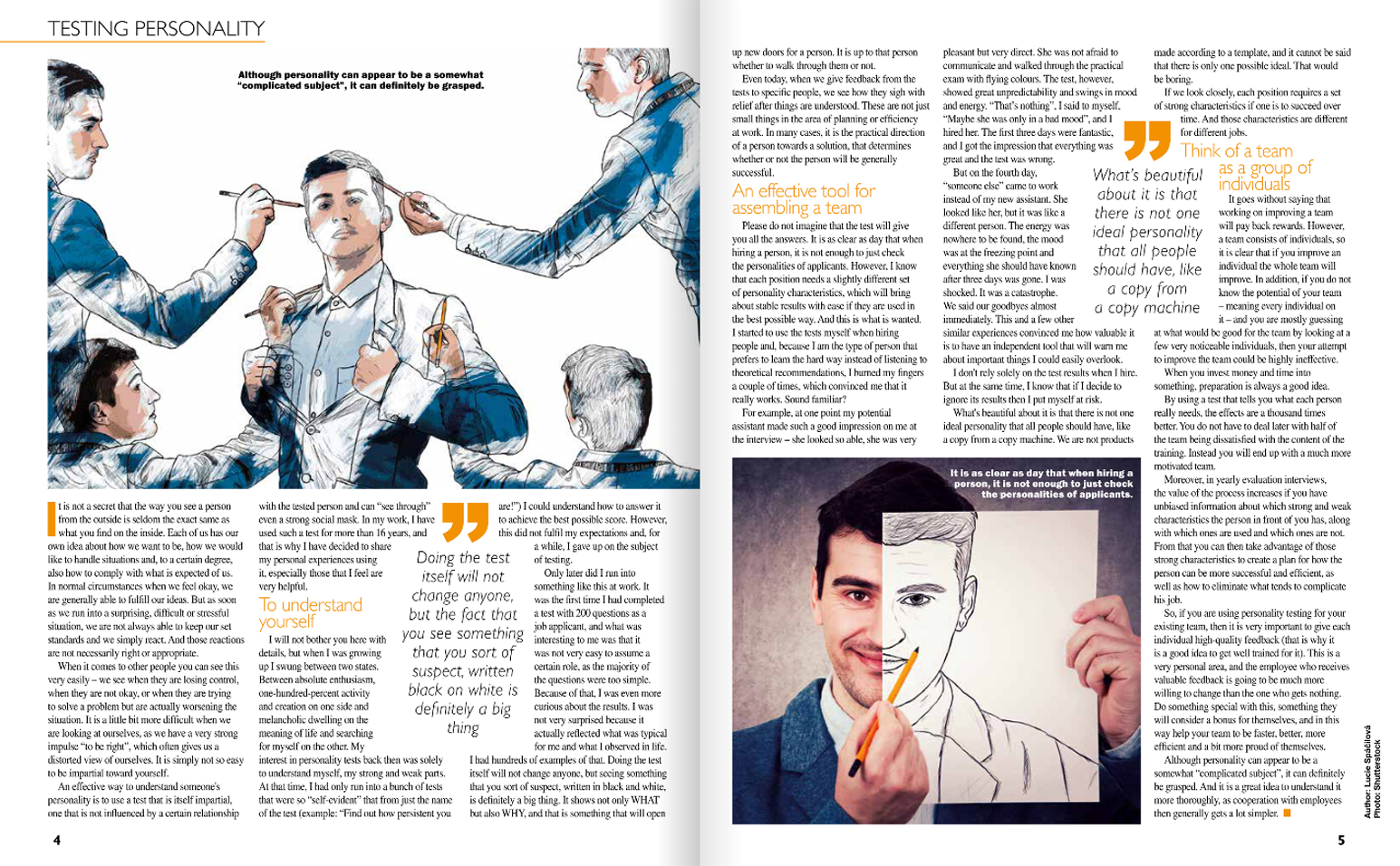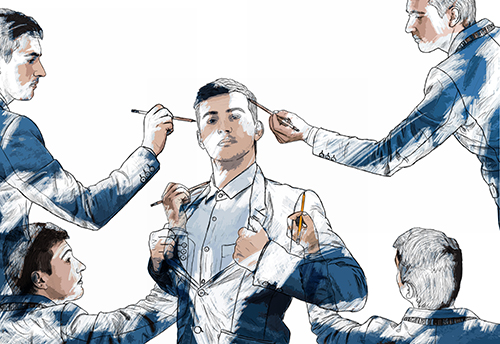
Testing Personality
Why should we test personality?
“Isn’t it a bit weird to test personality?” Anyone who has ever thought about what personality is and where it comes from might think that way. It is only “weird” when you are not measuring it with the right tools or don’t know how to evaluate the results.

© Shutterstock
Although personality can appear to be a somewhat “complicated subject”, it can definitely be grasped.
It is not a secret that the way you see a person from the outside is seldom the exact same as what you find on the inside. Each of us has our own idea about how we want to be, how we would like to handle situations and, to a certain degree, also how to comply with what is expected of us. In normal circumstances when we feel okay, we are generally able to fulfill our ideas. But as soon as we run into a surprising, difficult or stressful situation, we are not always able to keep our set standards and we simply react. And those reactions are not necessarily right or appropriate.
When it comes to other people you can see this very easily – we see when they are losing control, when they are not okay, or when they are trying to solve a problem but are actually worsening the situation. It is a little bit more difficult when we are looking at ourselves, as we have a very strong impulse “to be right”, which often gives us a distorted view of ourselves. It is simply not so easy to be impartial toward yourself.
An effective way to understand someone’s personality is to use a test that is itself impartial, one that is not influenced by a certain relationship with the tested person and can “see through” even a strong social mask. In my work, I have used such a test for more than 16 years, and that is why I have decided to share my personal experiences using it, especially those that I feel are very helpful.
To understand yourself
I will not bother you here with details, but when I was growing up I swung between two states. Between absolute enthusiasm, one-hundred-percent activity and creation on one side and melancholic dwelling on the meaning of life and searching for myself on the other. My interest in personality tests back then was solely to understand myself, my strong and weak parts. At that time, I had only run into a bunch of tests that were so “self-evident” that from just the name of the test (example: “Find out how persistent you are!”) I could understand how to answer it to achieve the best possible score. However, this did not fulfil my expectations and, for a while, I gave up on the subject of testing.
Only later did I run into something like this at work. It was the first time I had completed a test with 200 questions as a job applicant, and what was interesting to me was that it was not very easy to assume a certain role, as the majority of the questions were too simple. Because of that, I was even more curious about the results. I was not very surprised because it actually reflected what was typical for me and what I observed in life. I had hundreds of examples of that. Doing the test itself will not change anyone, but seeing something that you sort of suspect, written in black and white, is definitely a big thing. It shows not only WHAT but also WHY, and that is something that will open up new doors for a person. It is up to that person whether to walk through them or not.
Doing the test itself will not change anyone, but the fact that you see something that you sort of suspect, written black on white is definitely a big thing
Even today, when we give feedback from the tests to specific people, we see how they sigh with relief after things are understood. These are not just small things in the area of planning or efficiency at work. In many cases, it is the practical direction of a person towards a solution, that determines whether or not the person will be generally successful.
An effective tool for assembling a team
Please do not imagine that the test will give you all the answers. It is as clear as day that when hiring a person, it is not enough to just check the personalities of applicants. However, I know that each position needs a slightly different set of personality characteristics, which will bring about stable results with ease if they are used in the best possible way. And this is what is wanted. I started to use the tests myself when hiring people and, because I am the type of person that prefers to learn the hard way instead of listening to theoretical recommendations, I burned my fingers a couple of times, which convinced me that it really works. Sound familiar?
For example, at one point my potential assistant made such a good impression on me at the interview – she looked so able, she was very pleasant but very direct. She was not afraid to communicate and walked through the practical exam with flying colours. The test, however, showed great unpredictability and swings in mood and energy. “That’s nothing”, I said to myself, “Maybe she was only in a bad mood”, and I hired her. The first three days were fantastic, and I got the impression that everything was great and the test was wrong.
But on the fourth day, “someone else” came to work instead of my new assistant. She looked like her, but it was like a different person. The energy was nowhere to be found, the mood was at the freezing point and everything she should have known after three days was gone. I was shocked. It was a catastrophe. We said our goodbyes almost immediately. This and a few other similar experiences convinced me how valuable it is to have an independent tool that will warn me about important things I could easily overlook.
I don’t rely solely on the test results when I hire. But at the same time, I know that if I decide to ignore its results then I put myself at risk.
What’s beautiful about it is that there is not one ideal personality that all people should have, like a copy from a copy machine
What’s beautiful about it is that there is not one ideal personality that all people should have, like a copy from a copy machine. We are not products made according to a template, and it cannot be said that there is only one possible ideal. That would be boring.
If we look closely, each position requires a set of strong characteristics if one is to succeed over time. And those characteristics are different for different jobs.
Think of a team as a group of individuals
It goes without saying that working on improving a team will pay back rewards. However, a team consists of individuals, so it is clear that if you improve an individual the whole team will improve. In addition, if you do not know the potential of your team – meaning every individual on it – and you are mostly guessing at what would be good for the team by looking at a few very noticeable individuals, then your attempt to improve the team could be highly ineffective.
When you invest money and time into something, preparation is always a good idea.
By using a test that tells you what each person really needs, the effects are a thousand times better. You do not have to deal later with half of the team being dissatisfied with the content of the training. Instead you will end up with a much more motivated team.

© Shutterstock
It is as clear as day that when hiring a person, it is not enough to just check the personalities of applicants.
Moreover, in yearly evaluation interviews, the value of the process increases if you have unbiased information about which strong and weak characteristics the person in front of you has, along with which ones are used and which ones are not. From that you can then take advantage of those strong characteristics to create a plan for how the person can be more successful and efficient, as well as how to eliminate what tends to complicate his job.
So, if you are using personality testing for your existing team, then it is very important to give each individual high-quality feedback (that is why it is a good idea to get well trained for it). This is a very personal area, and the employee who receives valuable feedback is going to be much more willing to change than the one who gets nothing. Do something special with this, something they will consider a bonus for themselves, and in this way help your team to be faster, better, more efficient and a bit more proud of themselves.
Although personality can appear to be a somewhat “complicated subject”, it can definitely be grasped. And it is a great idea to understand it more thoroughly, as cooperation with employees then generally gets a lot simpler.